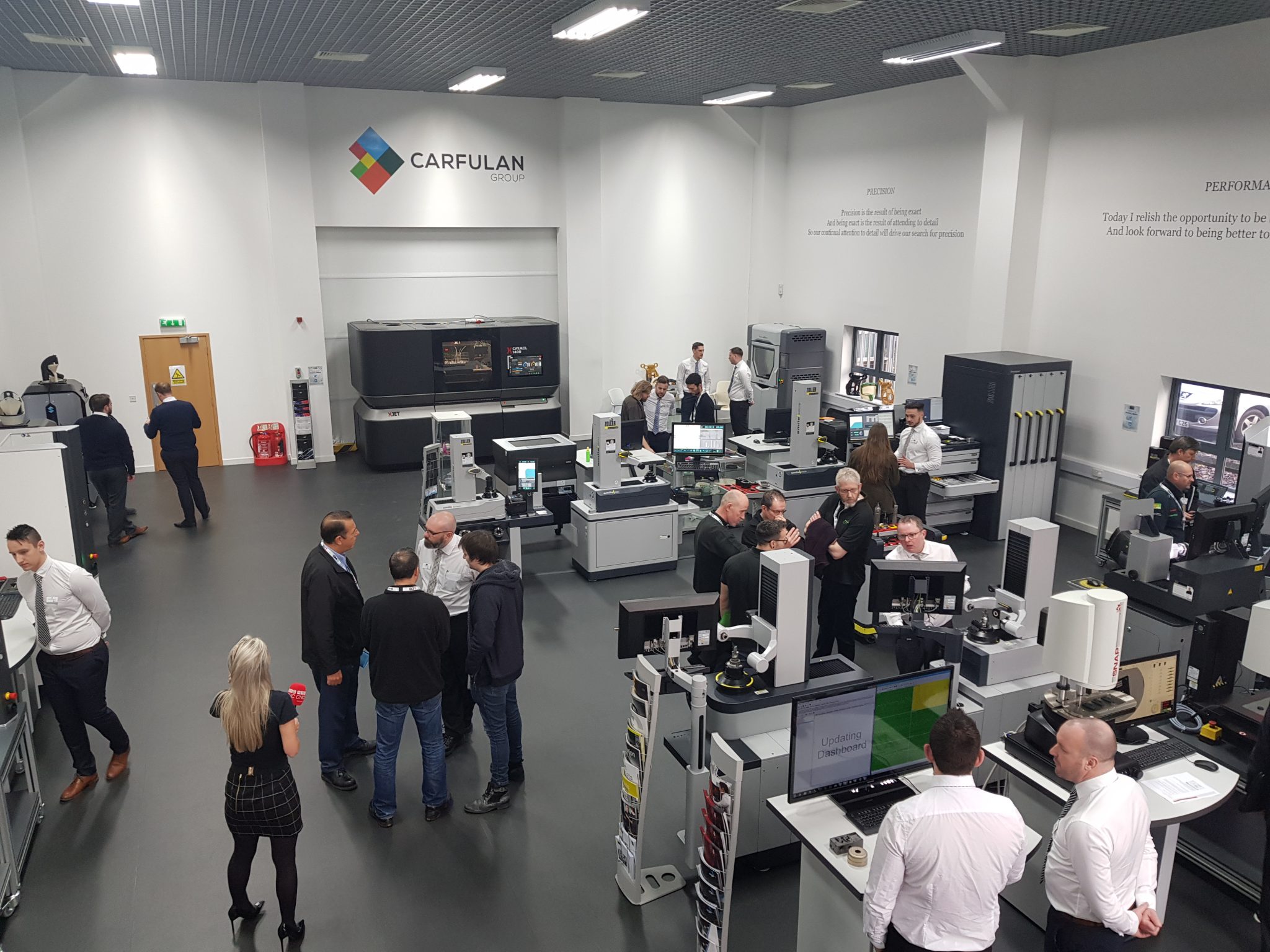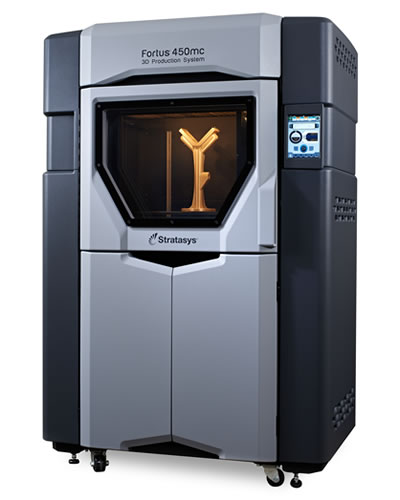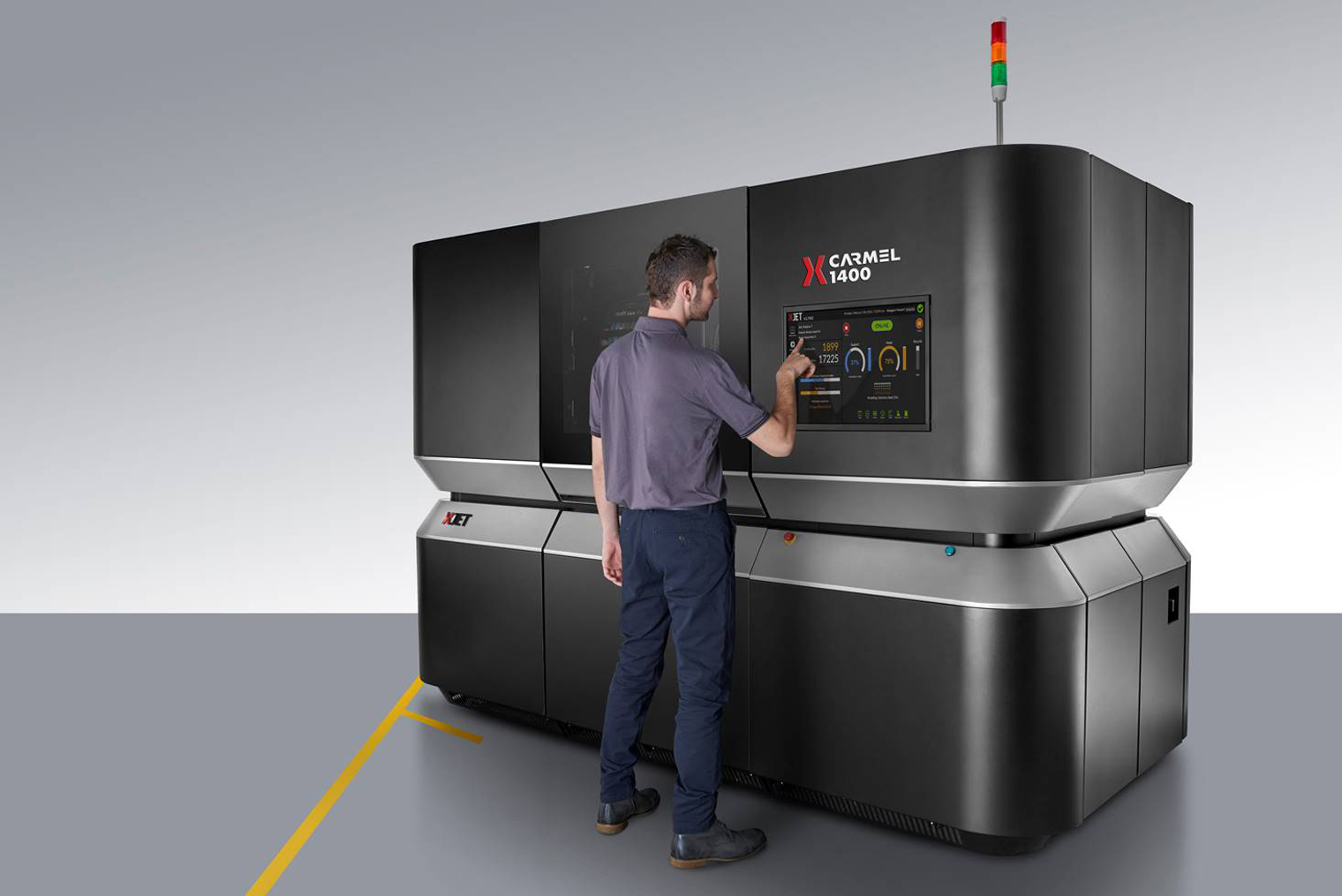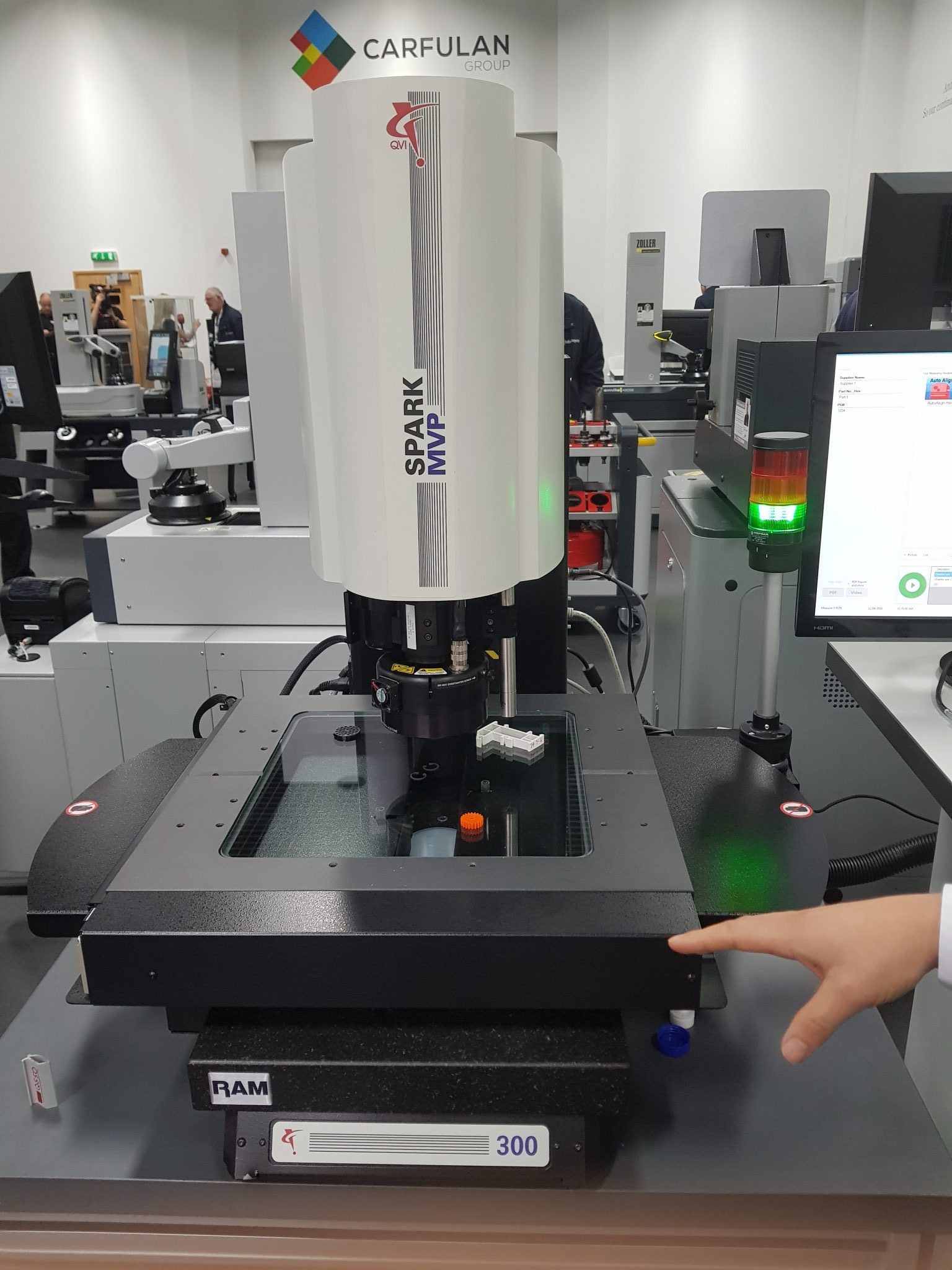3D Printing Industry was invited to the Carfulan Group open house event in Derby, UK on 4 December. The Carfulan Group is a reseller and service provider comprising three precision measurement (metrology) and one 3D printing company.
At the event were manufacturing experts, potential customers, and local academics, who came to see the variety of manufacturing technology in the showroom.
In September, the Carfulan Group signed a distribution agreement with XJet for the Carmel 3D printers. One of these printers, the Carmel 1400 was also the highlight of the Carfulan open house.
The event brought Dror Danai, XJet’s CBO and Haim Levi, VP Manufacturing and Defense markets of the company to England. I sat down with them to learn more about XJet and why the Israeli company has chosen Carfulan.
Later, I also spoke to SYS Systems’ Sales Manager, Robert Thompson, to learn more about the Carfulan group, and how each company in the group compliments the other.

The Carfulan Group
The Carfulan Group was founded 30 years ago when the owners brought the American company OGP on board. The Group now comprises OGP UK, a multi-sensor measurement equipment provider, Zoller, a presetting and measuring company, and an Italian non-contact machinery and quality control machinery supplier, Vicivision. A supplier of Stratasys 3D printers SYS Systems has been part of Carfulan for the past ten years. All these companies are based in Derby.
Robert Thompson explained, how often companies have an OGP system for metrology “and in the R&D facility … an Objet machine or a Stratasys machine. It’s such a crossover in what we do.”
Furthermore, Carfulan has its own engineers who perform maintenance and repair on the machines provided by partner companies. Thompson said this ensures the independence of the partner in the Group from each other.

NanoParticle Jetting technology
Early in the event, Danai gave a presentation on XJet’s Nano Particle Jetting (NPJ) technology.
XJet’s Carmel printers use metal and ceramic inks for 3D printing. The ink is made by XJet from metal and ceramic powders. The powders are processed to ensure that all the particles are of a uniform size. The ink is jetted onto the build plate through tiny nozzles in a liquid form. The binding liquid evaporates at a high temperature and the particles firmly bond with each other to make the 3D printed part.
One of the benefits of that Carmel systems over powder 3D printing is relatively short post-processing times. A part produced in the Carmel 1400 can be taken out and sintered and be ready for use.
Furthermore, with the recently introduced a soluble support material, post-processing becomes even faster.

The start-up nation
In the wider technology world, Israel is well known for the number of start-ups per capita. In 3D printing, the country is, of course, the home of one of the oldest enterprises in the industry – Stratasys.
Recently, more 3D printing companies like Nano Dimension, Massivit, MODIX, Objet (now a part of Stratasys) and XJet itself, have made their appearance on the market.
I wondered about this trend in Israel, which is a relatively small country by area and population. Danai explained that the “thing about the Israeli growth is that Israelis, since the early days but much more since the 80s realize that the Israeli market is very tiny.” And due to this, there is an outward-looking mindset among the Israeli entrepreneurs. Israeli entrepreneurs look to other countries for customers.
Danai continued “An Israeli pioneer or entrepreneur looks at the Israeli market, as a market that is good for testing the technology, but it’s never the end market. In our presentation, we always talk about Europe, the U.S, and Asia.”
Despite the technological advances Israel is small and still largely agricultural, Danai added. Haim Levi even joked that due to lack of natural resources (out of total area of the country only two percent is water) in Israel the country produces thinkers and pioneers.
Choosing a distribution partner
I enquired of Danai about the attraction of England for a metal 3D printing out of Israel. Danai began, “England was a natural choice for being a pioneer, also when start distributing we want to make sure that business model makes sense to partners, and there is no better place than England … which is one of the biggest markets in Europe and one of the biggest economies in the world.”
Furthermore, Danai commented that the English language is also a part of the choice, which makes business negotiations easier. And adding to this is the mutual understanding of business ethics between the Israelis and the British.
The Carfulan Group was chosen because it is considered an industry expert in sales. Danai said, “We want to be associated with companies like Carfulan, who have a high quality of showroom, engineers and salespeople, good feedback from our friends at Stratasys who worked with them for many years. Everything adds up to a level of comfort and trust that allows us to start here.”
Robert Thompson of SYS Systems elaborated “We have already got a well established 3D printing business, which straight away gives us people to talk about the XJet technology, but also within the other divisions of our Group, there may be somebody who uses Zoller pre-setting machine on a system to make ceramic parts, well if they are making ceramic parts they really need to know about XJet.”

Turnkey Manufacturing partners
Danai also said that Xjet has formed an agreement with a “turnkey manufacturing partners”. These partners will be responsible for manufacturing mechanical parts and machine assembly. But the core aspects of XJet 3D printers, such as the ink and printer heads will still be provided by XJet.
The reason behind the strategy of outsourcing is that the company believes that there are people more expert on this than XJet. And the strategy frees up XJet resources to focus on research and development, and sales.
Moving forward
Haim Levi, XJet’s VP Manufacturing and Defense markets, talked about the installation of the Carmel systems. Levi said that by the end of this year there will be seven XJet systems installed worldwide.
Furthermore, the sales of these seven systems were selective. The partners were chosen by XJet. The company needed partners that would share their expertise and their knowledge and feedback from direct use of the 3D printers.
Through this strategy of “selective sales” XJet will develop further knowledge of their own machine. This tactic will also help XJet develop new 3D printers in the future.
Danai said that in the coming years, XJet will explore multi-material jetting with multiple heads. Parts printed in four or five different materials in one go. Danai concluded, “metal and ceramics give us enough work to do for a decade or two, there are so many metals and so many ceramics.”
XJet will soon have a total of 120 employees and move to a bigger headquarters, a sign of the company’s recent growth.
To catch more news on advanced manufacturing subscribe to our 3D printing newsletter. You can also visit us on Facebook and Twitter.
If you are looking to start a new career, then visit our 3D Printing Jobs.
Featured image shows the Carfulan Group showroom. Photo courtesy of Umair Iftikhar

